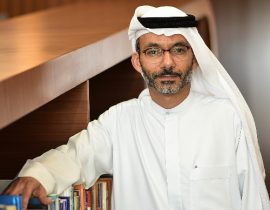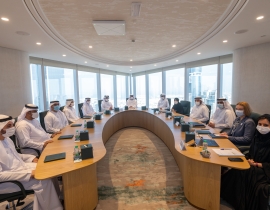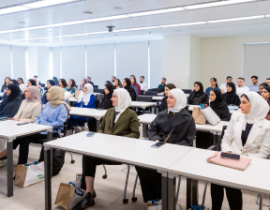Physicians should use social media strategically to shape the conversation on healthcare
Speakers at the first Middle East Healthcare Social Media Summit, underlined the need for physicians to use social media strategically to shape the conversation on healthcare. The two-day Summit, organized by Mayo Clinic in collaboration with The Mohammed Bin Rashid University of Medicine and Health Sciences (MBRU) and American Hospital Dubai, is being held from 9-10 December.
Speaking on the topic of Social Media and Professionalism in the first session of the Summit titled ‘Social Media and the Healthcare Provider’, Farris K. Timimi, Medical Director of the Mayo Clinic Social Media Network said that physicians need to strategically partner with patients and walk with them on their journey online as well as offline. Doing so will enable physicians to shape the conversation on healthcare, leverage information and ensure that credible content fills the void, he told an audience of decision makers and senior professionals from across the healthcare sector at the Summit held at the MBRU campus in Dubai Healthcare City
Platform for Engagement
He noted that with growing internet and mobile penetration, most people seek health information, communication and support online. Citing the example of the UAE, he said that the country leads the world in social media penetration. The UAE has 9.52 million active social media users, which gives it a social media penetration of 99%. It also has 19.23 million mobile subscriptions translating into a mobile penetration of 200% and a mobile social media penetration of 92% with 8.80 million users. Furthermore, in the UAE, the average time spent using social media is almost three hours, all of which provide a significant bandwidth for engagement with patients.
“The majority of health care employees are involved in social media and blocking won’t work. The majority of patients are also involved in social media, and ignoring them is not an option. Our human bandwidth can be either an asset or liability. The difference is defined by guidelines, orientation and training,” he said.
The first Middle East Healthcare Social Media Summit seeks to analyze the role of social media in enhancing healthcare and exchanging best practices and share new insights on the impact of social media on healthcare institutions and patients.
Dr. Amer Sharif, Vice Chancellor of MBRU, said the university is working with several leading healthcare institutions as well as international academic organizations in the field to exchange expertise and enhance understanding of global best practices. Partnering with Mayo Clinic to host the Summit, the first event of its kind in the region, is consistent with MBRU’s strategy and mission to become a global hub for innovative and integrated healthcare education and research, he noted.
“We are extremely pleased to partner with Mayo Clinic, a global leader in healthcare, and the American Hospital in Dubai, to organize this event. The Summit has brought together decision makers and senior professionals from across the healthcare sector to analyze the impact of social media on healthcare and share ideas on optimal strategies to use the medium. Through this event, we seek to generate insights that can help the research, academic and medical community and foster new ideas on improving healthcare services. The Summit provides a platform for sharing knowledge, expertise and experiences that can benefit the international healthcare community,” he said.
Powerful Tool for Awareness
Speaking about the positive impact of social media on society in an address titled ‘The Physician Influencer’, Dr. Anwar Alhamadi, Consultant Dermatologist and Adjunct Professor at Mohammed Bin Rashid University of Medicine and Health Sciences (MBRU) said social media can help patients understand their medical condition better and guide them on when to visit a doctor.
“As a physician influencer, I believe social media can be a powerful tool if utilized properly. It can be a great tool for awareness,” he said. “I’m on social media because I can use the platform to teach patients about certain conditions, debunk myths, learn from patients and listen to their views, point out pseudo-scientific information and also defend my specialty,” he said.
Alhamadi also highlighted the dangers inherent in marketing harmful products on social media platforms. Although the authorities are doing their best to crack down on such products, doctors can play a role in educating the public, he said.
Sharing three tips on how physicians can handle their social media accounts, he said: “It is important to have a strategy in place, be authentic and post shareable content. Social media can never replace the role of a doctor but can help raise the trust of patients in their physician.”
Public Health and Legal Issues
In a panel discussion titled ‘Public Health and Legal Issues’, His Excellency Dr. Amin Al Amiri, Assistant Undersecretary of Public Health & Licensing – Ministry of Health and Prevention discussed advertising and regulation on social media and the standards of approval in the UAE.
He said the UAE was the first country in the MENA region to issue regulations on healthcare related advertisements when the Cabinet Resolution No. 7 of 2007 Regarding Health Advertisements Regulation was enacted. The Law provides a legal framework that governs advertising by healthcare professionals and clinical institutes such as hospital and clinics.
“Most advertisements are reviewed by specific auditors and inspectors who work through an electronic system, which was introduced in the UAE in 2011. Each institute has an account where they can submit their request and follow the payment and approval process,” he said, noting that the requests are approved in less than 24 hours unless the documentation is not complete.
Dr. Al Amiri said the Ministry also regulates the media sector in terms of what advertisements they can publish. “Media institutions are aware that they cannot post advertisements without an approval from the ministry,” he said.
Dr. Al Amiri said that all healthcare related laws issued by Dubai have been enacted only after thorough engagement with stakeholders. Once the law is released, workshops are conducted for end users. Giving examples of recently issued laws, he said eight workshops were conducted for the Medical Liability Law of 2016 and five workshops were conducted for the Organ Transplant Law of 2016. Various stakeholders including health authorities, the private sector, the Ministry of Interior, Ministry of Economy and the Chamber of Commerce are invited to such workshops.
Speaking on the guidelines of the Dubai Health Authority (DHA) for physicians using social media, Dr. Marwan Mohammed Al Mulla, Chief Executive Officer of Health Regulation Sector, Dubai Health Authority, said they were published last September with the aim of encouraging the adoption of global best practices.
“With the spread of social media tools and applications and the increase in the adoption of these tools by healthcare facilities, we wanted to develop guidelines that were the first in the region to govern medical advertisements on social media. These guidelines further built on the federal law and were based on global best practices. They were also developed based on feedback from healthcare professionals and patients,” he explained.
Dr. Al Mulla also said the guidelines were aimed at guiding professionals on the importance of posting accurate medical information and not misleading the public or posting false information about competitors, as well as socially and culturally acceptable images.”
Hadeel Hajar, Manager- Professional Licensing at Dubai Healthcare City Authority – Regulatory Sector (DHCR) sought to correct misconceptions among investors on free zone rules regarding advertising. Free zones follow federal laws on advertising, she stressed.
“We have also created guidelines carrying extensive information on how people can use social media to share accurate information about the healthcare sector or services in their facilities. The point of the guidelines is to address any questions they may have and provide them a framework for what is generally acceptable in the country,” she added.
She further said that the Dubai Healthcare City Authority reviews advertisement material before it is sent to the Ministry of Health, which helps create a seamless process for business partners.
Apart from the conference held from 9-10 December, the Middle East Healthcare Social Media Summit, co-sponsored by MBRU and the American Hospital Dubai, a member of the Mayo Clinic Care Network, featured a pre-conference workshop on 8 December called Social Media Residency, which provided advanced training and consultation for those interested in practical knowledge of using social media tools in their health-related work.


